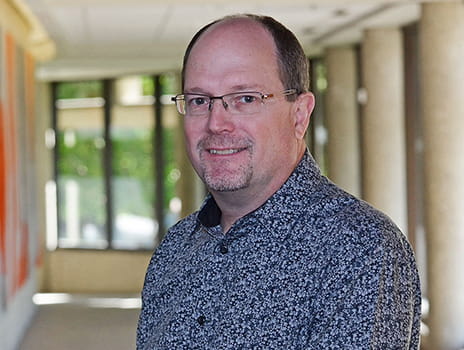- Home
- News Room
- Patient Stories Search Page
- Clinical Trial Shrinks Pancreatic Cancer Tumors
August 13, 2019
For Steve Kilgore, it all started with an itch that wouldn’t go away. His hands, his eyes, everything itched. And he couldn’t make it stop.
In 2009, the incessant irritation drove Steve to visit his primary care physician, who performed an ultrasound. The ultrasound showed that he had a tumor blocking the bile duct of his liver. Steve’s persistent itching was a symptom of jaundice, which he also exhibited.
Steve, 50, had an endoscopic ultrasound, or EUS, at The University of Kansas Health System, one of only 2 facilities in the region to offer the procedure. Physicians typically request an EUS when they suspect pancreatic cancer.
The EUS was followed by a fine-needle aspiration tumor biopsy at The University of Kansas Cancer Center. Results from the tests determined Steve had metastatic pancreatic neuroendocrine tumors (islet cell tumors). This uncommon form of pancreatic cancer affects 2,000 to 3,000 people annually.
Customized pancreatic cancer treatment
After receiving the diagnosis, Steve traveled to another cancer center for a second opinion. Oncologists there confirmed the same treatment prescribed at The University of Kansas Cancer Center. After testing, Steve learned that his cancer was too advanced for surgery. He had tumors in his pancreas, liver and lymph nodes.
At the cancer center, Steve had stents inserted to open the bile ducts of his liver. In addition, he received monthly injections of octreotide, a synthetic hormone used to treat pancreatic neuroendocrine tumors.
The octreotide injections were followed by chemotherapy, which briefly stabilized Steve’s cancer. The reprieve was short-lived, as the cancer progressed again. Steve then had liver embolization – with and without radiation – to reduce blood flow to the cancer cells and eventually destroy them. Despite these efforts, the tumors persisted.
At this point, physicians recommended Steve take part in a clinical trial. He was reluctant at first, he said, because of the potential for additional side effects.
“I wasn’t sure I could handle side effects on top of what I was already experiencing,” Steve says. “But ultimately I decided to do it. I could always stop if the effects were too bad.”
Steve was relieved when his side effects were controllable. He managed his nausea with medication, and the only other major symptom was fatigue.
Positive response to clinical trial
Steve’s physician, Raed Al-Rajabi, MD, a medical oncologist at The University of Kansas Cancer Center, said the 2-part clinical trial Steve takes part in is ongoing. Its purpose is to determine whether a new combination of medications will target Steve’s particular type of tumor and treat it effectively long-term.
“The preclinical data we’ve seen on this new drug combination indicates that it will work,” notes Dr. Al-Rajabi.
Dr. Al-Rajabi said he is pleased with Steve’s response from the clinical trial. Not only did his tumors shrink in size, but Steve’s side effects were also manageable.
“His response is better than we usually get with standard lines of therapy,” says Dr. Al-Rajabi. “Steve did very well in the trial, tolerating the side effects, while maintaining his quality of life. These are all considerations in the trial.
“Clinical trials are essential to find new therapies for patients that are less toxic, more personalized for individual tumors and provide longer, more sustained results," explains Dr. Al-Rajabi. "Our ultimate goal is to cure cancer, one step at a time. Every year, we find new options to cure and put tumors to sleep so they don’t end up taking patient lives.”
Steve is pleased about his results and the personalized care he’s received.
“Other medical facilities seem more impersonal. At The University of Kansas Cancer Center, I feel like they know me," says Steve. "Everyone is great – the staff, the doctors – my entire experience has been incredibly positive. And I’ve had the chance to change my life ... and, possibly, others’ lives, too.”
